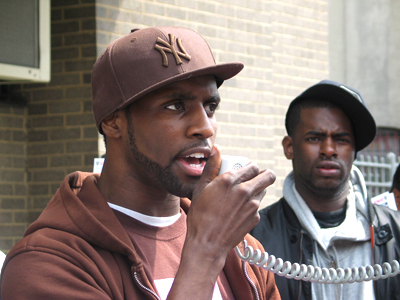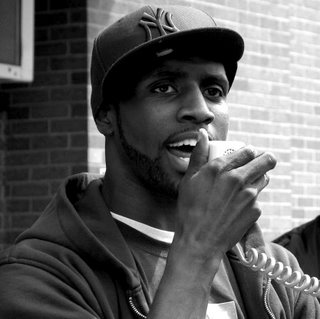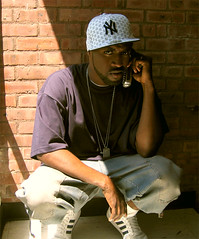Activism = Elitist?
In preparation for tomorrow's panel on the state of LGBT politics and activism, I was asked to think through a series of questions. I was so compelled, infuriated, perplexed, annoyed and tickled by the questions that I challenged myself to get my thoughts onto paper. I'll be sharing plenty of my responses with you here on this blog in the weeks to come, and I'd like to begin with the question that elicited the most lengthy and emotional response.
Is activism solely an elitist activity?

LarryLy addresses the crowd at the Rashawn Brazell Memorial March.
Photos by Andres Duque
Activism can often seem like an elitist enterprise, since we often use funding, corporate support and the audibility that they provide as the sole criteria by which determine the quality and impact of our work. Needless to say, this is a problematic practice, but not one essentially rooted in the enterprise of activism itself.
For me, the question of whether it is or is not fundamentally elitist lies in this question: How do we measure the success of activism? How do we quantify the impact of our work? More responsible conversations in our public forums or more government funding? (These two are not mutually exclusive, but they do represent two estranged value systems.)
 An example from my work: When the press was hungry for quotes about the horror of hate crimes, the RBMF instead offered a broader commentary about the value of black gay life in general. In our public statements and in the building of our organization, we refused to use the narrow vectors of crime and disease to define our lives and instead pushed a platform that identified and prioritized the root issues to which the mainstream media felt they had no responsibility: namely, the social penalties for standing at the intersection of marginal identities.
An example from my work: When the press was hungry for quotes about the horror of hate crimes, the RBMF instead offered a broader commentary about the value of black gay life in general. In our public statements and in the building of our organization, we refused to use the narrow vectors of crime and disease to define our lives and instead pushed a platform that identified and prioritized the root issues to which the mainstream media felt they had no responsibility: namely, the social penalties for standing at the intersection of marginal identities.Instead preoccupying ourselves with the race and sexuality of Rashawn’s killer (which will not be determined until the NYPD invest the same amount of resources in the investigation as they did with Nicole DuFresne and Emmet StGuillen), we consistently spoke about the role that Rashawn’s intersectional identity plays in the ongoing disparity in the coverage the cases receive and their attendant public outcry.
Why? Because the race, sexuality and even the motivation of the killer cease to be significant priorities when the police, the media and the public refuse to value the life of the victim.
 So, in what some might identify as a key moment in the history of black LGBT organizing in New York, we used our audibility strategically to create more and louder conversations about the value of our lives. I like to think that our work is playing a role in shifting the community further away from the pigeon hole of single-issue organizing and toward a more holistic platform that honors the complexity of our lived experience as an intersectional people. To me, this is an important development in the landscape of black LGBT organizing.
So, in what some might identify as a key moment in the history of black LGBT organizing in New York, we used our audibility strategically to create more and louder conversations about the value of our lives. I like to think that our work is playing a role in shifting the community further away from the pigeon hole of single-issue organizing and toward a more holistic platform that honors the complexity of our lived experience as an intersectional people. To me, this is an important development in the landscape of black LGBT organizing.However, the Memorial Fund boasts no corporate sponsors and no steady source of income, save our grassroots fundraisers. Whereas the RBMF staff has had to work doggedly for nearly a year just to touch the $5000 mark, Imette St. Guillen's folks were able to generate more than $250,000 in less than five months.
So, if one uses financial gain as the means to evaluate the efficiency of the RBMF, we may not appear to be as successful as our white, straight, upper and upper middle-class compatriots in the fight against violence. Indeed, this reality reeks of a synthesis of racism, classism and homophobia that adds insult to injury for a community morning the loss of a brother, son, lover and friend. And this is the reality that I’ve dealt with everyday since March 4, 2005, when I got news of Rashawn’s murder.
Luckily for us, however, we do not measure the fruits of our activism this way. We are encouraged by the fact that despite the death grip of the compounded injustices at play in the Brazell murder, we have managed to contribute to a significant change in the way we talk about our lives, our bodies, our sex and our deaths.
So, my answer is no. Activism is not an elitist enterprise. Not for those of us whose value system is rooted steadfast in the health and well-being of our communities. Not for those of us who commit ourselves to the unglamorous work that goes on in between and after the marches, the rallies and the vigils. Not for those of us who do not enjoy the audibility afforded to the white heterosexual upper class and the hundreds of thousands of sympathetic dollars that their identities have a knack for garnering. It's not an elitist enterprise for me.




9 Comments:
First I scrolled down to read, "So, my answer is no." Then after reading I agree with you even more.
Still, the word activism in its present usage only goes back as far as 1920. It succeeds the birth of capitalism, and any word carrying "active," I feel, can't help but hint at profitability. This is not the motivating force for activism, but it is at the root of the decision-making process. Those who have the right to choose between active and passive behaviors are by no means elites, but are certainly capable of devoting resources and time to a cause. The more time one social class has, the more activists you will see in its ranks? Hmmm.... I think the word 'middle' has to come before the word 'class' when counting activist heads, because a philanthropist is not an activist. So if the upper middle class has more time to be activists, then their causes will be championed proportionally.
I think one paradox that exists is: activism benefits groups, but the individual (as you know) should not profit. So the individual should not be considered the "elite." If I'm to consider activism as elitist, it is the benefitting group that must be deemed the elite. I think in most cases, the RBMF especially, the idea of an elitist charity is absurd. However, I get mail every day from a whole lot of elitist non-profits who shall remain nameless.
Another reason why someone may confuse elitism with activism? We use the word too much: calling activism and the accomplishments of activism the same thing. Saying is one thing, doing is quite another. I'm just posting a comment on a blog, so I'm one to talk, but elitism for the individual activist can only come after the activism itself.
Excellent blog.
Goddamit! I have been in similar situations where I have been asked to 'prove' my activist credentials in light of my activism around a friend's murder and my question has always been: i might not have been as effective in my activisim but whar have YOU done? Thanks so much for sharing your thoughts, Larry, some of us greatly appreciate the RBMF's work and will support it for as long as it takes.
activism is only considered elitist by those who have a narrow definition of what is considered to be activism.
i personally think, it is much more than organizations, protests, or marches. what about everday survival? is that not activism?
Activism is made for the elite. I have never known for media coverage, fundraising, social panels and conferences to have attendance of anyone that are considered to be in the low class unless they are the subject. Exactly who attend those events? What is the whole purpose of these events? It is all amount one or two things you must have, money and notoriety. I never seen a rich bum nor see a struggling mother of eight living in the projects attending these events. I guess this is why I never attend when I get these invitations for such menial and derogatory events exploiting this disadvantaged and poor.
I never seen a rich bum nor see a struggling mother of eight living in the projects attending these events.
but those people are STILL surviving in the best ways that they know possible. the mother could just lay down and die; surrender to the system that placed her into the situation--but her and other women like her don't. activism is much more than fundraising...
marklow:
thanks for thinking through this with me. i would hope that the "active" in "activism" would sooner state its goal to be equality or justice than "profit". Capitalism may been driven by profit, but capital is still a means and not an end...especially when ethical activism is concerned. More about your comment on the upper middle class time investment to activist engagement ratio below...
Andrés:
Looks like you and I share the misfortune of interacting with the same factional and counterproductive peanut gallery! It's good to have such a devoted and thoughtful compatriot here in the proverbial trenches!
And I can't say enough how much the RBMF (and LarryLy in particular) appreciates your support and your work. You'll certainly be an honored guest at my (imaginary) Legends Ball.
Nubian:
Preach! This is precisely the point I insisted on during last night's discussion. Being out in your workplace is an important type of activism. Waking up each day and navigating the homophobia and misogyny that dominate so many of our spheres and impact us in very micro, very embodied ways is an important type of activism. There are countless forms that the enterprise of activism can take, and we do ourselves and our communities a disservice when we allow narrow definitions of what constitutes activism to minimize our lived experiences and discredit our efforts.
Captain:
Did you bother to read the post to which you are responding? The question I posed was how do we define activism and how do we measure its success? The problem that I identified was that many of us make the mistake of using visibility in the mainstream media and the procurement of funding as the criteria for fruitful activism.
That said, your comment proves my point. What you've demonstrated for all of us that it is not activism itself, but rather a flawed and painfully narrow definition of activism that causes some to view it as an elitist activity.
Anyone with a real commitment to and understanding of the "struggling mothers" you invoke here would recognize that the work that they do is indeed activism; activism at its best.
Activism at its core is indeed activity that is rooted in an understanding of the human condition and how we as human beings can adversely affect it...
Activism can be tainted, just like most other activities, by notions of elitism...Sure there are "activists" that are more concerned with their "personal" visibility and financial gain than with the ACTUAL issue (i.e. Jesse Jackson...Al sharpton) but the real agents of change, in my humble opinion, are the people who remain nameless...the many people who's mere presence makes a statement (i.e. if you showed up to the rally then you did the good work).
When the activism is REALLY not about you and your personal gain, in my opinion, that is the best activism...
Now we can spend hours hypothesizing over the "intent" of the activist and at the end of day the results are ALL that really matter (whether or not the activist(s) is in it for themselves or not)...but community is created when one thinks communally...and it is hard to do that when your concern is yourself and the possible benefits you can extract from your "activism."
this is a really interesting conversation. as someone who considers themselves an activist/organizer, i'll be the first to say that activism is easily interpreted as elitist. there are plenty of reasons, too many to list here, but there are some onerous ones.
chief amongst these is a funding structure which places foundations at the top of a non-profit pyramid, instead of at the bottom. this creates a terrible process in which programs, organizations and whole campaigns are made viable simply by the amount of interest within a foundation. conservatives got hip to this problem 40 years ago and switched up the pyramid, enabling foundations to pump money into MOVEMENTS and work that was already happening. this creates a highly relevant and relatable activism culture among social conservatives and is the main reason we live in the country we do today. people find their rhetoric appealing, whether we like it or not. and amongst regular americans, conservatives are looking less and less elitist when they talk about family values, morality, etc etc. meanwhile, our side runs presidents like kerry (who can't speak outside monotone and sounds like the new england wealthbag he is) and have panels upon panels upon panels engaging no one but the usual suspects.
as progressives, we need to do think outside the box and heed the model conservatives set. we need to reframe the way we think of money in our movement(S) and start to create maverick initiatives that aren't tailor made for foundations. we need to be relevant to our base (never mind the greater public we may want to reach). when we founded the rashawn brazell memorial fund, we didn't think about what was fundable-- we thought about what we could do and say best. what mattered to others at that moment in time.
so you can't blame those who think that activism is a little elitist. its not attractive and doesn't speak to them. its made for program officers and not the dude on the street who wants to be engaged, but doesn't know how.
we're the ones we've been waiting for and we need to act if we're ever going to make an impact.
Activism is labelled elitist for a number of reasons including: hierarchal structure, status based on degree of oppression, and sometimes because its members are interpreted as thinking themselves above civil society. I think at specific places, and at specific times, there have been strains of activism who behave awfully elitist when viewed from a specific perspective, but this is almost always the result of an individual's character flaws. Certainly, activism doesn't obliterate flaws.
I think it's vital to remember that elitism requires that its members perceive themselves as superior to anyone not of their class; and also that for an -ism to be elitist by definition, it must *require* elitism. Monarchism for example is elitist because it requires an elite, cannot survive without it, and perhaps cherishes it more than anything else. The same cannot be said of activism.
While elitism may or may not exhibit elitist qualities from time to time, and perhaps at times for good reason, and such accusations should be considered seriously; activism is neither an elitist pursuit, nor a pursuit for the elite.
Post a Comment
<< Home